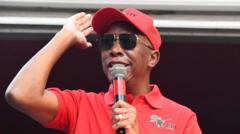A year into their coalition, South Africa's African National Congress (ANC) and the Democratic Alliance (DA) are struggling with deep-rooted tensions and public disputes. Despite these challenges, both parties are reluctant to consider a separation, aware that such a move could harm their electoral prospects and governance.
South Africa's Coalition Tensions: A Tricky Partnership

South Africa's Coalition Tensions: A Tricky Partnership
The uneasy alliance between South Africa's ANC and DA parties faces public scrutiny and internal conflict as both sides weigh the implications of a potential split.
South Africa's coalition government, known as the Government of National Unity (GNU), continues to navigate its first year in a climate of discontent and friction between two historically opposed political factions: the African National Congress (ANC) and the Democratic Alliance (DA). This coalition was birthed from necessity after the ANC lost its parliamentary majority in the last elections, prompting the once-rival DA to join forces.
Despite initial hopes for effective collaboration, recent events have highlighted the underlying tensions. First, the duo showcased their ability to work together during a diplomatic encounter with then-President Donald Trump, demonstrating that, in some areas, they could present a united front. However, the relationship has been marred by disagreements and public disputes resembling a rocky marriage, with the populace bearing witness to the struggles.
Political analysts suggest that the partnership has the potential to stabilize South Africa's political landscape, particularly in the eyes of big business, which welcomed the coalition with cautious optimism. The DA seized the opportunity to influence governance and prevent further radical coalitions among leftist factions like the Economic Freedom Fighters (EFF) by joining the ANC in the GNU.
Nevertheless, party leaders have not shied away from airing grievances. Recently, DA leader John Steenhuisen expressed frustrations following ANC President Cyril Ramaphosa's controversial dismissal of DA Deputy Minister Andrew Whitfield, arguing that such unilateral decisions threaten economic stability and threaten to undermine the coalition's integrity. The squabble over contentious legislation and budgetary practices indicate that ideological and strategic rifts remain unresolved.
While Steenhuisen has criticized Ramaphosa's management of cabinet corruption and presented opposition tactics even as a coalition partner, it reveals the DA's dual approach: seeking governmental involvement while also challenging ANC policies that they view as detrimental. The DA's internal divisions on this approach suggest that the coalition’s stability could be at risk, particularly as some factions advocate for a complete withdrawal while others insist on remaining engaged.
Experts note the political dance both parties are performing as their reliance on each other grows in a landscape punctuated by voter dissatisfaction. The fear of backlash from constituents discourages a breakup. For the ANC, a divorce could further erode their already faltering position, while the DA understands that leaving the GNU could expose them to criticism for abandoning leadership responsibilities.
The current stalemate reflects a lack of effective communication and collaboration mechanisms, raising questions about the sustainability of this coalition. Steenhuisen's comments underscored the imperative for more dialogue within the GNU, urging a more thorough discussion of shared goals.
Political analysts predict that both the ANC and DA will need to reconsider their strategies to navigate these tensions, lest they risk the opportunity to consolidate their power and influence in future elections. As the prospect of municipal elections looms, the coalition members must decide whether to address their issues internally or risk further deterioration of their partnership, potentially drawing South African voters' ire in the process.


















